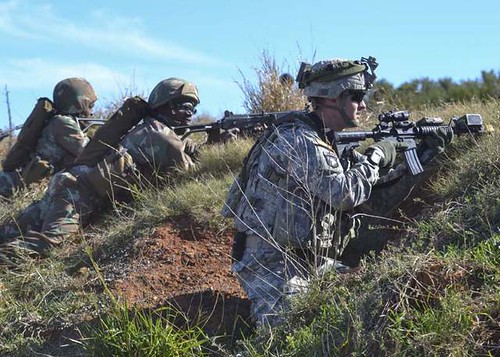
United States Army conducting joint war simulations with the South African National Defense Forces (SANDF) during 2013. AFRICOM has been enhancing its presence on the continent., a photo by Pan-African News Wire File Photos on Flickr.
First regionally aligned BCT shares lessons learned
Sep. 16, 2013 - 06:17PM
Army Times
Shared Accord 2013
U.S. Army and South African soldiers reacted to a simulated ambush by opposition forces during exercise Shared Accord 2013 near Alicedale, South Africa, on July 26.
By Michelle Tan
Staff writer
Working with foreign partners presents soldiers with a new set of challenges, according to the commander of the first unit to be regionally aligned with a combatant command.
Soldiers from 2nd Brigade Combat Team, 1st Infantry Division, have been aligned with Africa Command since last spring, conducting more than 40 missions in such countries as South Africa, Niger, Chad, Djibouti, Malawi, Uganda, Burundi and Sierra Leone.
In August, more than 350 soldiers from the brigade returned from their largest exercise in Africa to date: Exercise Shared Accord with the South African National Defence Force.
More than 100 more missions, which include participating in exercises and sending mobile training teams to work with host-nation armies on marksmanship or first aid, are planned for fiscal 2014.
“There’s a formal and informal channel, and we’re sharing our lessons learned,” said Col. Jeff Broadwater, commander of 2nd BCT.
This includes working closely with 4th BCT, 1st Infantry Division, which is scheduled to take on the AFRICOM alignment next summer from 2nd BCT, and sharing lessons with Forces Command and the Center for Army Lessons Learned, Broadwater said.
His advice for commanders who are about to be regionally aligned: relationships matter; factor visa processing times into your planning; make sure you’re able to communicate with your soldiers, especially in countries that may not have reliable connectivity; and be flexible.
“You’re dealing with host-nation countries, you’re dealing with the Department of State and other levels that are organizing and funding these missions for you,” Broadwater said. “Things will move to the left, things will move to the right, the number of days will increase or decrease, you must maintain a flexible and adaptive mindset on this. This is something that’s great for leader development.”
The Army is regionally aligning its forces with each geographic combatant command. This will give troops the chance to focus and train on a specific region and participate in theater security cooperation and exercises with partner militaries. It also will give combatant commanders access to trained and ready troops after playing second fiddle to the demand in Iraq and Afghanistan.
“Regional alignment of forces demonstrates the vital commitment by the chief of staff of the Army and the secretary of the Army to a globally responsive, regionally engaged force,” said Paul Boyce, spokesman for FORSCOM. “Regional alignment of forces is the Army’s way of preparing scalable, tailorable forces to meet the demands of the nation’s six combatant commands across the globe.”
FORSCOM, which oversees most of the Army’s conventional combat forces in the U.S., is responsible for aligning its subordinate units with the various combatant commands.
The Army continues to implement the regionally aligned force concept, Boyce said.
“The initial priority was alignment of corps and divisions,” he said.
The exercise
During Exercise Shared Accord, 2nd BCT, 1st Infantry Division, sent a portion of its brigade headquarters and a task force from 1st Battalion, 18th Infantry Regiment. The 350 soldiers made up about half of the U.S. forces who participated in the exercise.
The others included about 40 soldiers from the 82nd Airborne Division, a Marine Reserve military police company and airmen from the Rhode Island National Guard, Broadwater said.
The soldiers partnered with about 3,000 South Africans at the headquarters level, as well as on the ground, as the exercise included movement to contact against an “aggressive, live” opposing force, combined live-fire training at the company level, and a convoy live-fire event, Broadwater said.
The alignment has been beneficial for his soldiers and the brigade, Broadwater said.
“[The soldiers] enjoy going out there and being on point for the nation and being responsible to set the best foot forward as representatives for our country,” he said.
“We also learn things, and we can bring back things into our training that we see in various countries that makes us better when we train our own soldiers.”
No comments:
Post a Comment